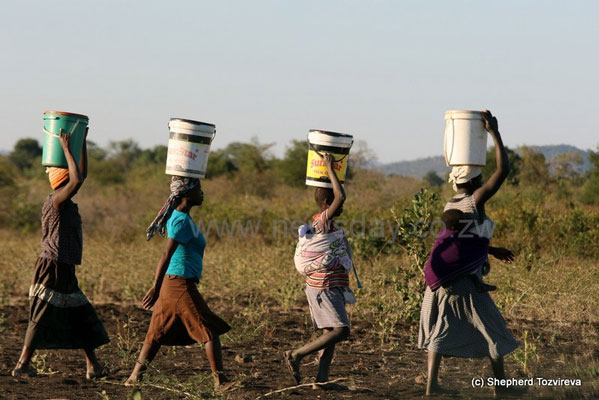
On October 15, Zimbabwe joined the rest of the world in commemorating International Day of Rural Women, running under the theme Sustainable infrastructure, services and social protection for gender equality and the empowerment of rural women and girls.
Social commentary with Moses Mugugunyeki

The theme places the empowerment of rural women at the heart of fulfilling the vision of the sustainable development goals (SDGs).
Despite progress on some fronts, gender inequalities remain pervasive in every dimension of sustainable development; and in many areas, progress is too slow to achieve the SDGs by 2030.
Just like most developing countries, Zimbabwe’s progress has been at a snail’s pace due to traditional practices, rituals and attitudes which perpetuate the discrimination and infringement of women’s fundamental civil liberties.
In most societies, women are not able to inherit estates and property while the unequal dominant patriarchal value system is the order of the day. Gender division of labour is rife especially in rural communities where women are placed in the “kitchen” while men do all the “macho” jobs.
Although gender sensitisation workshops with traditional authority structures have been conducted in the country with the aim of transforming rural communities to be more sensitive to women’s economic and social rights, and gender equality and equity issues, women continue to suffer at the hands of harmful traditional and cultural practices.
In its endeavour to create an enabling environment for the attainment of equity and equality between women and men, Zimbabwe has ratified various international conventions and declarations on gender equality — CEDAW (1979), the Beijing Platform for Action (1995) and the Sadc Gender and Development Declaration (1997).
- Chamisa under fire over US$120K donation
- Mavhunga puts DeMbare into Chibuku quarterfinals
- Pension funds bet on Cabora Bassa oilfields
- Councils defy govt fire tender directive
Keep Reading
During the era of the Lancaster House conference constitution, Zimbabwe put in place various national legislative instruments aimed at guaranteeing women’s legal and constitutional rights. these included the Labour Relations Act of 1984 (now Labour Act of 2000), Legal Age of Majority Act of 1985, Taxation Act of 1990, Deeds Registry Amendment Act of 1991, White Paper on Marriage Inheritance of 1994, Administration of Estates Act of 1997, Sexual Offences Act of 2002 and the Domestic Violence Act of 2007.
Some of these legislative instruments are also contained in the new charter, which seeks to foster the economic and social rights of women.
In a number of communities, notably the Tonga in Binga, the Ndau in Chipinge and the Doma in Mbire, among others, customary law has been allowed to prevail over these legislative instruments leaving women vulnerable to harmful traditional and cultural practices.
According to Platform for Youth Development Trust (PYD), a community-based organisation in Chipinge, harmful cultural practices are a structural problem in the area and there are different forms in which this phenomenon is manifesting.
“These harmful cultural practices are manifesting in the district because Ndau women are torn between breaching confidentiality by using the law and observing allegiance to a patriarchal culture,” said PYD gender and advocacy officer Cynthia Gwenzi.
“In order to address such an anomaly in the efforts to fight harmful cultural practices, PYD has endeavoured to raise awareness on the negative effects of the harmful cultural practices.
“One of the glaring impediments to the organisation’s advocacy work on confronting harmful cultural practices are the disparities that exist between the law and the Ndau culture.”
Pearl Matibe, founder of Advocates for Progress, a United States-based independent think-tank, pointed out that a number of women were not aware of the legal recourse in place.
“Most women lack information, education and access to the legal system,” she said.
PYD said they were going to the grassroots with the hope of transforming communities to be more sensitive to women’s economic and social rights.
“As an organisation, we have been doing work on strengthening young women’s capacity to confront harmful practices, and we believe that our efforts are bearing fruit as there are more people coming forth with their unfortunate experiences,” Gwenzi said.
The government in collaboration with civil society has tried to create an “enabling” terrain for rural communities and rural patriarchal structures to be more receptive to gender equality and equity issues.
However, such efforts have hit a brick wall as some traditions and practices that are detrimental to the physical or mental integrity of girls and women override the formal legal system.
Such harmful practices, which have been allowed to be part of society are indeed contravening some sections of the Sadc Protocol on Gender and Development that stipulates that: “States shall take measures, including legislation where appropriate, to discourage traditional norms, including social, economic, cultural and political practices which legitimise and exacerbate the persistence and tolerance of gender-based violence with a view to eliminate them.”
While, Zimbabwe has gone further by coming up with some legally binding system through enacting legislation that protects women from discriminatory laws, the conflict between formal and customary legal systems is frequently unaddressed. This has left women at the mercy of damaging traditional and cultural practices.
In his message to mark International Day of Rural Women, United Nations secretary-general António Guterres described empowering women as a great benefit to children and the community.
“The empowerment of rural women and girls is essential to building a prosperous, equitable and peaceful future for all on a healthy planet,” he said.











